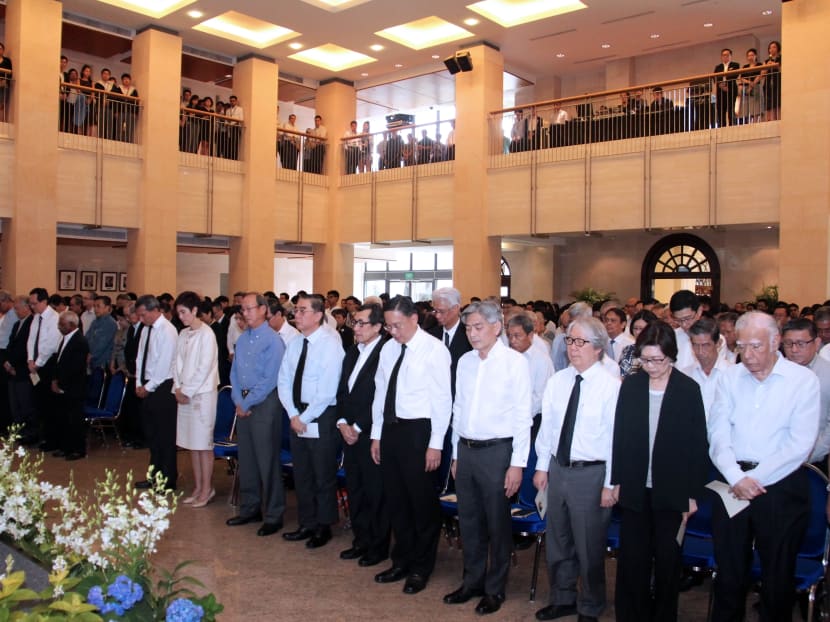Ex-President S R Nathan ‘turned MFA around, left indelible mark’
SINGAPORE — There might not be a Ministry of Foreign Affairs (MFA) today if not for Mr S R Nathan’s success in turning it around in the late 1970s and instituting various practices that still stand today, said Foreign Affairs Minister Vivian Balakrishnan on Wednesday (Aug 24) as he paid tribute to the former President’s leading role in crucial chapters of the nation’s foreign policy.

Joined MFA staff observed a minute's silence as they paid tribute to Mr S R Nathan on Wednesday (Aug 24). Photo: MFA
SINGAPORE — There might not be a Ministry of Foreign Affairs (MFA) today if not for Mr S R Nathan’s success in turning it around in the late 1970s and instituting various practices that still stand today, said Foreign Affairs Minister Vivian Balakrishnan on Wednesday (Aug 24) as he paid tribute to the former President’s leading role in crucial chapters of the nation’s foreign policy.
Speaking at a remembrance ceremony at MFA yesterday afternoon, Dr Balakrishnan noted that founding Prime Minister Lee Kuan Yew had put some of the best men into the Ministry shortly after Singapore’s independence and Mr Nathan himself was transferred from the union movement to MFA in 1966.
A year later he became a Deputy Secretary and after a brief stint outside, Mr Nathan came back to MFA as First Permanent Secretary from 1979-1982.
“He was given two years in which to make a difference, failing which the Prime Minister intended to disband MFA, and we would become part of the Prime Minister’s Office,” said Dr Balakrishnan.
“The fact that we are still here and still a Ministry is testament to his success,” he added, noting that many of the institutional practices that Mr Nathan introduced are still in place. This include information notes or analytical reports to encourage clear and succinct thinking and writing as well as daily staff meetings known as “morning prayers”.
“His foresight and his efforts to build up these institutional practices have paid off,” added Dr Balakrishnan, who also lauded Mr Nathan’s contribution as Singapore’s envoy to Malaysia and the United States and in raising the nation’s international profile during his 12 years as President.
“He played a leading role in many defining chapters of our foreign policy — signing of the Asean Declaration, resolving the sensitive issue of foreign bases in the region and the Vietnamese occupation of Cambodia.”
Dr Balakrishnan was speaking to 400 guests at the ministry, including former Cabinet ministers Mr S Dhanabalan, Mr Yeo Cheow Tong and Mr Raymond Lim, and staff who served with Mr Nathan in MFA.
The event began with the guests observing a moment of silence, followed by Dr Balakrishnan’s tribute and a wreath laying ceremony. Three pioneer Foreign Service Officers who worked closely with Mr Nathan — Ambassador-at-Large Bilahari Kausikan, Ambassador-at-Large Ong Keng Yong and Mr Chew Tai Soo — also delivered eulogies.
“Mr Nathan was tough on us. He had to be to whip us into shape,” said Mr Kausikan, adding that Mr Nathan left an indelible mark on MFA and all who worked for him.
“He had high standards that he would not compromise. He treated service to the country with high seriousness and taught us to take service seriously too.”
Mr Ong said he learnt several things from Mr Nathan.
“First, no job is too big or too small. Second, there are two sides for everything. He believed that all MFA officers must be able to do the strategic thinking and writing as well as the administrative and operational chores,” said Mr Ong, who served as deputy to Mr Nathan in Kuala Lumpur and Washington DC.
“His diplomatic skills and energy level left me panting for breath very often,” said Mr Ong, recalling how Mr Nathan had paid for a professional music teacher to polish up the singing of the MFA staff in Kuala Lumpur when he found that they did not sing Majulah Singapura well enough.
“The fact is this is a humble ordinary man who became a super achiever with his guts, instincts and tenacity. He was so natural. But he continuously drew on each episode of his fascinating life to be a better person and an extraordinary leader of our community.”
Mr Chew, a retired veteran diplomat, described Mr Nathan as a generous, caring boss.
“When I arrived in New York in 1991 to take up post, I was surprised to find Mr Nathan waiting for me in the residence. He had flown in from Washington where he was our Ambassador just to welcome me. This is another manifestation of his personal warmth and kindness,” said Mr Chew.
Speaking to reporters later after attending the private wake at Mr Nathan’s house at Ceylon Road, Dr Balakrishnan noted that while Mr Nathan was a demanding boss, he was respected by many in MFA.
“(If you) speak to more senior, pioneers officials, they always describe him as a very tough task master, demanded the highest standards of performance. But at they same time he was also a very caring superior. So this combination of demanding and expecting the best...and yet caring for every single officer (who served him) made him well-loved (and) well-respected.”
Dr Balakrishnan also related how he was Mr Nathan’s eye doctor and had operated on him when he was President. “Great stress on me but I was very proud. He was a wonderful patient, completely unassuming, did not ask for anything extra or anything special,” said Dr Balakrishnan.
“I consider myself blessed to have watch him from afar to get to know him at a personal level and now to be able to stand on the strong foundation that he laid.”






